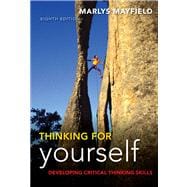
| Preface | |
| Introduction | |
| Introduction to Critical Thinking | |
| Learning How You Think | |
| Discovery Exercise | |
| Experiencing How We Actually Think: An Exercise for the Whole Class to Complete Together | |
| Learning from Sharing How We Think | |
| What Is Critical Thinking? Relationship to Creative Thinking | |
| Diagram: Different Functions of Left and Right Brain | |
| Why Learn Critical Thinking? The Habits of a Critical Thinker | |
| Box: Habits of a Critical Thinker | |
| Basics of Critical Thinking | |
| Observation Skills: What''s Out There? Discovery Exercises | |
| Comparing Our Perceptions | |
| What Is Observing? Observing a Cube | |
| Observation and Insight | |
| Using Observation Skills to Develop New Knowledge | |
| Reading | |
| Look at Your Fish, by Samuel H. Scudder | |
| Core Discovery Writing Application | |
| Observing the Familiar: Vegetables and Fruit | |
| Evaluating Your Work by Using the Scoring Boxes | |
| Alternate Core Discovery Writing Application | |
| Observing the Unfamiliar: A Tool | |
| The Observation Process: Sensing, Perceiving, Thinking | |
| Barriers to Observation | |
| How Discomfort Leads Us to Think | |
| Diagram: A Choice for Thinking | |
| The Rewards of Skilled Observation | |
| Building Arguments | |
| Observation Skills | |
| Reading | |
| The Innocent Eye | |
| Chapter Summary | |
| Chapter Quiz | |
| Composition Writing Application | |
| Survival as a Result of Observing: A Descriptive Narrative Essay | |
| Readings: God Grew Tired of Us | |
| Walking | |
| Spanish Harlem at Night | |
| Word Precision: How Do I Describe It? Discovery Exercise | |
| On Finding the Right Word | |
| Discovery Exercise | |
| Taking an Interest in Dictionaries | |
| How Well Do You Use Your Dictionary? Clear Thinking Depends on Clear Word Definitions | |
| What Makes a Definition? Diagram: Definition Boundaries | |
| Exercise | |
| Word Boundaries | |
| Kinds of Definitions | |
| The Connotations of Words | |
| The Importance of Defining Key Ideas | |
| Word Concepts | |
| Defining Reality | |
| Defining Truth | |
| What Is Critical Reading? Building Arguments | |
| Word Choices | |
| Chapter Summary | |
| Chapter Quiz | |
| Composition Writing Application | |
| A Short Essay of Definition | |
| Box: Clustering | |
| Readings | |
| Rankism by Robert W. Fuller, Nerds by David Anderegg, Saved by Malcom X | |
| Advanced Optional Writing Assignment | |
| Facts: What''s Real? Discovery Exercises | |
| Beginning with the Word Fact | |
| Learning to Recognize Facts | |
| Verifying Facts | |
| Facts and Reality | |
| Facts Are Not Absolutes | |
| Distinguishing Facts from Fiction | |
| Feelings Can Be Facts | |
| Facts and Social Pressure | |
| Diagram: Standard and Comparison Lines in the Asch Experiment | |
| Facts and Our Limited Senses | |
| Reading | |
| The Blind Men and the Elephant | |
| Statements of Fact | |
| Core Discovery Writing Application | |
| Using a List of Facts to Describe a Photograph | |
| Standards We Use to Determine Facts | |
| Chapter Summary | |
| Chapter Quiz | |
| Composition Writing Application | |
| Writing a Short Fact-Finding Report | |
| Readings: Our Daily Meds by Melody Peterson, Fast Food Nation by Eric Schlosser | |
| Building Arguments | |
| Advanced Optional Writing Assignment | |
| Inferences: What Follows? Discovery Exercise | |
| Recognizing Inferential Thinking | |
| Defining Infer, Understanding the Words Infer and Inference | |
| Discovery Exercises | |
| Drawing Inferences from Evidence | |
| Drawing Inferences from Facts | |
| Distinguishing Inferences from Facts | |
| How Inferences Can Go Right and Wrong | |
| Reading | |
| The Adventure of the Speckled Band by Sir Arthur Conan Doyle | |
| Drawing Inferences from Careful Observation | |
| Core Discovery Writing Application | |
| Using Facts and Inferences to Describe a Photograph | |
| Generalizations Are Inferences | |
| Composition Writing Application | |
| Writing a Paragraph from Facts, Inferences, and Generalizations | |
| Core Discovery Writing Application | |
| Analyzing the Use of Facts and Inferences in a Newspaper Article | |
| Reading | |
| Tougher Grading Better for Students | |
| Building Arguments:Inferences | |
| Chapter Summary | |
| Chapter Quiz | |
| Readings | |
| Friends by Tim O''Brien, He Fixes Radios by Thinking by Richard P Feynman, The Mistake of the Sand Flea by Paul Krafel | |
| Objectives Review of | |
| PROBLEMS OF CRITICAL | |
| Table of Contents provided by Publisher. All Rights Reserved. |
The New copy of this book will include any supplemental materials advertised. Please check the title of the book to determine if it should include any access cards, study guides, lab manuals, CDs, etc.
The Used, Rental and eBook copies of this book are not guaranteed to include any supplemental materials. Typically, only the book itself is included. This is true even if the title states it includes any access cards, study guides, lab manuals, CDs, etc.